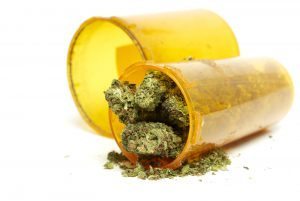Alternative Therapies Group, the first medical marijuana dispensary in Massachusetts history, opened its doors earlier this June. Governor Baker granted the dispensary a temporary waiver permitting the sale of Cannabis which has not been tested for lead and other chemicals. For patients reaping the health benefits of medical marijuana, it’s a long-awaited victory. For the Department of Public Health, it marks yet another race against the clock.
Are Massachusetts’ Medical Marijuana Testing Procedures Too Strict?
Back in April, we wrote about the sorry state of Massachusetts’ languishing dispensary system. Thanks to abundant red tape the process of getting licensed – much less opening for business – fell more than a year behind schedule, to the extreme detriment of thousands of registered Massachusetts Cannabis patients whose conditions qualified for medical marijuana. Better late than never, the Department of Public Health (DPH) subsequently streamlined its dispensary licensing procedures in hopes of patients receiving actual care.
Despite the streamlining of the application process, that only applies to new license candidates, hurdles remained in place for dispensaries that have already won their provisional licenses. It required intervention from Governor Baker to allow the first RMD to actually open for business.
On the morning of Wednesday, June 24, Alternative Therapies Group (ATG) in Salem became the first dispensary to open in Massachusetts. (A quick peek at the DPH’s official chart of the “Current Status of All Registered Marijuana Dispensaries” shows that ATG’s retail location in Salem was approved to sell as of June 23, 2015, while ATG’s cultivation arm in Amesbury was approved to grow on December 31, 2014.)
While ATG’s heavily-publicized if discreet debut represents a historic moment in Massachusetts’ long and convoluted relationship with Cannabis – and more importantly, tremendous relief for patients – the path to get there hasn’t always been smooth. Because the availability of medical marijuana isn’t hampered exclusively by budgetary concerns or the political climate – hazards to human health can present roadblocks, too.
Before it can be sold to patients, medical marijuana must pass Massachusetts’ rigorous chemical regulations – regulations which Kevin Gilnack, executive director of the Commonwealth Dispensary Association, describes as “the most conservative testing limits in the country.” Similar to FDA regulations for food and beverages, these testing regulations strictly limit the acceptable levels of a various chemicals and contaminants which may be present in medical Cannabis. If Cannabis tests too high for pesticides, solvents, lead and other heavy metals, and/or other microbiological contaminants, it’s deemed unfit for sale.
In theory, that sounds like a perfectly reasonable and even desirable safeguard. After all, patients who smoke or otherwise administer medical Cannabis are trying to feel better, not worse. Certainly, no one wants to get lead poisoning.
The problem, according to Massachusetts Cannabis Research Labs president Michael Kahn, is that the acceptable thresholds are so low and so strict that they actually hurt patients more than they help. “I am concerned,” Kahn said, “about patients not having access due to too-stringent levels.” As Gilnack notes, Massachusetts imposes tighter controls than any other state in the country – about half of which either legalized or decriminalized recreational and/or medical Cannabis.

Waiver Grants Dispensary 90 Days to Sell Cannabis, DPH to Review Standards
In an effort to strike a reasonable balance between health standards and access to already long-delayed care, Governor Charlie Baker responded with a compromise. On June 19, Gov. Baker granted ATG a three-month, one-time waiver permitting the dispensary to sell marijuana – as long as it was labeled with warnings disclosing that it had not been tested for chemicals.
“Patients have waited to access marijuana for medical purposes for far too long,” said Gov. Baker. “This waiver will allow industry laboratories a little more time to reach full operation while providing safe amounts of medical marijuana for qualifying patients who need it.”
“We are not lowering our standards for the testing of marijuana for medical purposes,” state health and human services secretary Marylou Sudders reassured the press. “Safety is job one. The waiver allows for small amounts of marijuana to be dispensed for medical use while testing facilities ramp up.”
The real issue, however, isn’t one of “ramping up” but rather of what are the reasonable assumptions that went into setting the levels in the standard. In MA at patient can purchase up to 10 oz of medical marijuana in a 60 day period. This is quite a large amount, and while it may be appropriate for short term needs like those of patients undergoing chemotherapy for cancer, is probably in excess of the reasonable needs of chronic illness patients. Nonetheless, the standard for marijuana safety testing was based on the assumption that patients would use that much medicine all the time. This leads to an extremely low safe level, and is likely overly conservative. Ultimately an over conservative testing standard leads to situations like we have now, in which the product can not meet the standard, and can not be sold.
Additionally, as expressed to me by Dr. Kahn, the states requires testing for 18 potential pesticides, only about half over which can be tested for by the states independent laboratories. Testing for additional pesticides require instruments that are not currently available in the state and are prohibitively expensive. Moreover, the outlawed 18 pesticides are only a handful of the potentially harmful pesticides that could be used. It remains unclear why those 18 were chosen from the 100 or so contenders.
Reconsidering the safety levels and the assumptions made is what needs to be done. DPH has 3 months.
If you’re a fan of chemistry, you might be interested in skimming through a DPH document titled “Protocol for Sampling and Analysis of Finished Medical Marijuana Products and Marijuana-Infused Products for Massachusetts Registered Medical Marijuana Dispensaries,” dated May 7, 2015, which breaks down the acceptable levels for lead (and other harmful chemicals) under Exhibit 4: Analysis Requirements and Recommended Limits for Metals in Finished Medical Marijuana Products, as follows:
- Arsenic
- Finished Plant Material – 353 µg/kg
- Cannabis Resin – 2,352 µg/kg
- Cannabis Concentrate – 2,352 µg/kg
- Cadmium
- Finished Plant Material – 145 µg/kg
- Cannabis Resin – 964 µg/kg
- Cannabis Concentrate – 964 µg/kg
- Lead
- Finished Plant Material – 212 µg/kg
- Cannabis Resin – 1,411 µg/kg
- Cannabis Concentrate – 1,411 µg/kg
- Mercury
- Finished Plant Material – 701 µg/kg
- Cannabis Resin – 470 µg/kg
- Cannabis Concentrate – 470 µg/kg
The following section (7.3 Pesticides Residues and Plant Growth Regulators) states that “all production batches of finished plant material must be tested for residues of prohibited pesticides” – hence the need for Gov. Baker’s waiver.
“ATG intends to offer a safe and enjoyable experience for our patients,” said a statement from the dispensary.
It may be time to consider talking to your doctor about Cannabis. Medical marijuana has helped countless patients manage their symptoms and enjoy a greater degree of physical comfort in their everyday lives. If you’re living with chronic pain, chronic insomnia, cancer, arthritis, anxiety, ALS, depression, MS, glaucoma, HIV/AIDS, or are undergoing chemotherapy, medical Cannabis could be right for you. Call Dr. Tishler at (617) 477-8886 to start discussing your medical needs in a confidential consultation.


